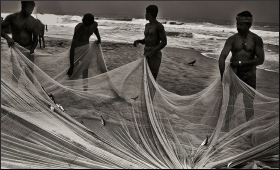|
|
|

|
Exports body develops protocol to check seafood adulteration
|
|

|
|
| Top Stories |
 |
|
|
|
SME Times News Bureau | 18 May, 2020
The Marine Products Export Development Authority (MPEDA) on Monday
announced that it has developed a testing protocol for formaldehyde
adulteration in seafood.
This measure came in the wake of
repeated incidents of the presence of formaldehyde for preserving
seafood in various domestic markets in the country in recent times.
MPEDA
Chairman K.S. Srinivas said that this adulteration poses serious
challenges on food safety and has a potential to become an irritant in
India's seafood exports to various markets and to address this, the
Quality Control laboratory of MPEDA at its headquarters has developed a
testing protocol for formaldehyde adulteration in seafood.
"The
Kochi laboratory, accredited by National Accreditation Board for Testing
and Calibration Laboratories (NABL) and approved by Export Inspection
Council (EIC), has developed and validated a method for detecting
formaldehyde in seafood using high-performance liquid chromatography
(HPLC)," he said.
This method is able to quantify formaldehyde in
fish and fishery products and meets the national requirement as per
Food Safety and Standard Authority of India (FSSAI).
In addition,
the Kochi lab has facilities for screening of farmed shrimp samples for
banned antibiotics under Pre-Harvest Test (PHT) certification
programme.
In another major step, MPEDA has started formally
extending testing services in the field of microbiology from its
state-of-the-art microbiology laboratory to the seafood exporters and
other stakeholders of the industry.
The lab is capable of testing
various microbiological parameters in water, fish and fishery products
and spices. The laboratory has also got a molecular biology section that
can handle testing of pathogenic viruses in shrimps.
"All the
guidelines and protocols charted out by the government, such as social
distancing, wearing of masks and use of sanitisers, are being strictly
followed at the offices and laboratories of MPEDA," Srinivas added.
|
|
|
| |
|
|
|
|
|
|
|
|
|
|
|
|
|
|
| |
| Customs Exchange Rates |
| Currency |
Import |
Export |
US Dollar
|
84.35
|
82.60 |
UK Pound
|
106.35
|
102.90 |
Euro
|
92.50
|
89.35 |
| Japanese
Yen |
55.05 |
53.40 |
| As on 12 Oct, 2024 |
|
|
| Daily Poll |
 |
 |
| Do you think Indian businesses will be negatively affected by Trump's America First Policy? |
|
|
|
|
|
| Commented Stories |
 |
|
|
|
|
|
| |
|